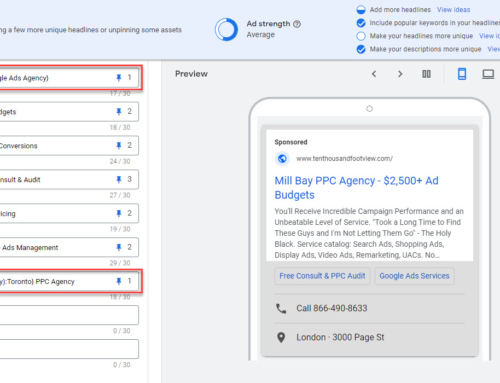There is mounting evidence that Google will be sunsetting keyword targeting in the foreseeable future. Do I think that’ll happen within the next year, certainly not. Do I think in 3-years from now we won’t be targeting keywords at all, you betcha.
In this article, I’ll explore the motivations for this fundamental change and the evidence that this is going to happen.
Note: This article was updated on April 12th, 2022
Why Does Google Want To Get Rid of Keywords?
Google faces challenges from regulators, competitors, scammers, and their Google Ads customers (advertisers).
Regulators
The big challenge here is the push towards more consumer privacy. By removing keyword and other types of user-selectable targeting, Google can ensure advertisers cannot target individual users or users that fit into protected groups. We can see this in action with the recent removal of demographic and zip code targeting for housing and lending advertisers.
Competitors
Google faces stiff competition from Facebook, Amazon, and Microsoft to a lesser degree.
Scammers
One of Google’s mandates is to provide a safe, positive, and enjoyable experience for users of their search engine. Despite tightening up on many fronts, there are still many advertisers committing fraud. In terms of search, the ability for anybody to target any keyword allows unscrupulous types to hunt for victims through Google Ads. Google is trying to mitigate this by requiring Google Ads business verifications and by promoting local service ads with even more stringent registration requirements. Removing keyword targeting would allow Google to fully control what search terms an advertiser would show for. They could dial up and down “access” based on user experience.
Advertisers
Advertisers, particularly small business advertisers, want an easier way to advertise on Google. They would prefer to dispense with the cost of hiring an ad agency and minimize their own time managing Google Ads. Removing keyword targeting is one of many ways Google can push the “easy button” for this audience.
What is the Evidence that Keywords Might be Going Away?
Smart Shopping Campaigns
While you could never directly target keywords with shopping ads, we can review search terms that generate impressions, clicks, and sales, and add negatives to block low performing search terms. We can also use search terms reports to hone product titles and descriptions to boost performance.
With Smart Shopping, we can’t add negatives and we can’t even see what search terms are triggering our ads.
Smart Campaigns
Taking things to the next level, Google now offers a hybrid Smart search/display campaign that only requires some basic business information. No keywords to target and no search queries reports.
No More Display Keywords
Google recently discontinued audience keyword targeting for display ads, well sort of. You can no longer target placements using keywords but you can create custom intent audiences that are keyword and/or domain-based. This is fundamentally different as it’s audience based and you will not see any performance metrics for specific keywords.
Search Terms Report Updates
Google has stopped including search terms that don’t have many clicks in search query reports. We don’t know what exactly “many” means but it looks like anything with just 1-2 clicks is no longer shown. Google claims this was done to improve privacy controls, and I believe them. However, many advertisers believe this is just another step towards moving more control over to Big G.
Local Service Ads
Google has been rolling out Local Service Ads for the past couple of years. This program sits completely outside of Google Ads and offers advertisers a pay per lead model. There are no ads, keywords, or anything else to set up except to register your business and choose what categories to advertise in. While this doesn’t directly affect keyword targeting in Google Ads, it means fewer advertisers running search ads, effectively reducing the overall keyword targeting footprint.
Changes to Phrase Match Keywords
In February 2021, Google is rolled out changes to phrase match keywords that effectively maee them perform like BMM (broad match modified) keywords. That means we now no longer have control of the order that search queries appear in.
This is additive to changes over the past few years that have expanded matching for exact keywords to include similar meanings, the inclusion of prepositions, and more.
Recommendations to use Broad Match Keywords
If you’re using automated bidding you might have noticed a “recommendation” to swap out all of your keywords for broad match variations. The problem with this is you will completely lose control over your keyword strategy and Google will max out your spending. They will also flag your campaign to raise your budgets in a week or two.
Now you can, of course, ignore the recommendation. And that’s fine if you’re not a Google Partner. If you’re a Google Partner (like our agency) many of your accounts could take a 10-15% Optiscore hit. And as Google Partners will shortly have to maintain 70%+ Optiscores we’re getting painted into a corner. Do as Google wants, or no longer be a Google Partner.
Dynamic Ads
As with the broad match keyword recommendations, Google has been pushing dynamic ads for the past several months. Dynamic ads automatically target keywords that Google chooses for pages you include for targeting.
Performance-Max Campaigns
At the beginning of 2022 Google rolled out Performance-Max. This new campaign type is a catch-all that covers dynamic search, display, discovery, and shopping. Intended as a supplement to core search campaigns, this “black box” solution targets any and all keywords not already covered explicitly by search. Furthermore, there is no way to block keywords with negatives, although that’s a feature that we may get in the future.
What Should You do to Prepare?
First, there is no reason to panic. It’s unlikely you’ll wake up one day and keywords will be gone. This is a big enough change that Google will announce it and give advertisers time to update their strategies.
That said, there are some things you can do to prepare. If you’re not using automated bidding you should start testing it ASAP. Over the past couple of years, it has become clear that automated bidding outperforms manual bidding in the vast majority of campaigns. If you’re concerned about a possible drop in performance you can run an experiment to split test it against your current bidding method.
Start using audiences more widely in your campaigns. For search, add whatever makes sense using the ‘observation’ method. If you’re using manual bidding you can set bid adjustments to optimize each audience. If you’re using auto-bidding, Google will automatically optimize for selected audiences.
At a minimum, you should be including relevant in-market and remarketing audiences. Remarketing should include web visitors and if possible, an uploaded customer list.
Whether or not you’re running shopping ads start testing P-Max campaigns immediately. You can bet that traditional shopping will be sunset long before search campaign keywords are. In the meantime, this is your best shot for scaling your account beyond search.
If you’re winging it alone, consider reaching out to an agency or expert to assist you through the transition. You may still be trying to deal with the MIA search terms issue when suddenly Google is throwing the big change to phrase/BMM keywords at you. Want us to provide a free assessment of your Google Ads account? You can schedule a free audit right here.
Summary
I believe the writing is on the wall for keywords. Clearly, we’re heading for a time within a year or two where we only have access to broad match keywords. Beyond that, we may be kissing keywords goodbye for good.
Google is pushing dynamic ads, broad match keywords, turning off some keyword match types, and hiding our search queries. These are all clear signals that user-selectable keywords won’t be around for too much longer.







how can we target billingual custumers.. Like in the states for example, how can we target people that speak English and Spanish now that the Keywords will be gone.. thanks in advance
For now, there is no issue with search campaigns but eventually, there may be. In the future I would segment your campaigns by language using language settings and then simply match your ad copy to your language. Google should be able to figure out what keywords are appropriate for those languages. This is how you could do it now in P-Max, for example.
Great post and advice Ed! I’m wondering: do you expect Google will still allow negative keywords to be added to most campaigns in a couple of years?
It’s hard to say whether negative keywords would be depreciated before positive (target) keywords. If you look at the standard shopping model, you only have access to negatives. But that’s a bit of a different beast. I’d guess they will discontinue negatives at the same time the discontinue positives.
What that may look like is a migration towards the “Smart” campaign type with more and more features being removed from search ads over time, before finally sunsetting that campaign type.